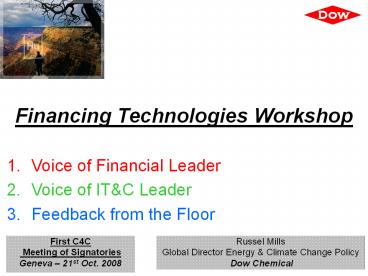Russel Mills - PowerPoint PPT Presentation
Title:
Russel Mills
Description:
Nick Robins, Head of Climate Change Centre of Excellence ... 2030 from EE (Energy Efficiency) Always dedicate half time/resources to EE. Cost increasingly ... – PowerPoint PPT presentation
Number of Views:62
Avg rating:3.0/5.0
Title: Russel Mills
1
Financing Technologies Workshop
- Voice of Financial Leader
- Voice of ITC Leader
- Feedback from the Floor
- Russel Mills
- Global Director Energy Climate Change Policy
- Dow Chemical
First C4C Meeting of Signatories Geneva 21st
Oct. 2008
2
Voice of Financial Leader
- Investments Policy
- but also GHGs
- 2 New projects
- Efficiency investable
- Adaptation investable
- Communication Results/Policy Needs (May 2009)
Nick Robins, Head of Climate Change Centre of
Excellence
3
Adaptation Narrow uncertainty gap to identify
capital priorities
Efficiency (cheapest, fastest, most under-used) -
understand investment opportunity required
policy innovations
4
Voice of ITC Leader
1. Advanced technologies innovation
- ITC 2 of Global GHGs
- but Hi-growth
- Mobile China Climate Strategy
- Reduce own GHGs
- -40 (2005-10) intensity basis (7 Mn tons)
- Example cool servers not room (45 savings)
- Solar power where feasible
- Assist customer reductions
- Reduced travel
- E-boxes to recycle phones
- Public awareness via large workforce
2. Innovation in Green Packaging
3. Alternative Energy
4. Working with Suppliers
5. Involving Employees in Environmental Protection
Mr. Li Zhengmao, Vice President
5
Feedback from the Floor
- Covered but not resolved
- Adaptation
- Technology transfer
- Developing economies based on more emissive fuel
sources - 5 feedback groups
- Chris Tuppen BT
- Job van Harmelen TNT
- Steve Brooks Pfizer
- Mario lieder Johnson Controls
- Nick Robins HSBC Andrew Howard Goldman
Sachs Kate Levick - CDP
6
Feedback from the Floor
- Get/stay long term
- Specific financing packages for longer term
energy efficiency investments - Public banks best practice model
- 50 of GHG savings till 2030 from EE (Energy
Efficiency) - Always dedicate half time/resources to EE
- Cost increasingly driver
- need to factor in carbon cost into sector
investments (irrespective of where in world) - understand impacts of short term cost savings in
increasingly carbon constrained world
7
Feedback from the Floor
- New policies (carrots sticks) to address
business model breakthroughs (not only tech
breakthrough) - Make ESCO model work also for continuous
cumulative incremental improvements - Leverage disruptive technology thinking for
disruptive employee communication - Powerful stakeholder base for behavioural change
- Putting C4C network 2 work
8
Feedback from the Floor
- Preferential investments currently where CC risk
for own emissions better managed - Also recognise the value chain market solution
opportunities - Market valuation needs credible /common info
disclosure - VC model best practices?
- C4C as a network to agree /improve common
performance standards - Cooperative programmes with CDP WRI/WBCSD (GHG
reporting protocol)
9
Feedback from the Floor
- No single / simple solutions we need all
options - Local London end-user ecotax enabled TNT electric
car introduction - Sector specific policy innovations
- Housing and Transport largest fastest growing GHG
growth - Multiple existing technology / solutions
available - End use legislation need to accelerate
implementation - Bigger sticks for existing technologies better
carrots for new innovations - Stronger direct business involvement (sector
expertise) in Government I.G. policy
development - Case histories to spread learnings
10
- EXAMPLE Dow Case History
- Get Long term - Stay Long term
- A History Of Efficiency to ensure Sustainability
1906 Dow partners with George Westinghouse to
develop energy saving Co-Generation 1935 First
industrial use of bacteria to degrade phenolic
waste 1948 First full-time industrial
hygienist 1967 War on BTUs energy
conservation program launched 1970 Dow publicly
commits to product stewardship role 1979 Dow
Chemical Foundation formed supports science
education 1986 Waste Reduction Always Pays
(WRAP) program launched 1987 Dow commits to
Responsible Care 1997 Dow CEO Frank Popoff
pens Eco-Efficiency The Business
Link to Sustainable Development
11
10 year Resource Efficiency Program
STEP 1 Relentlessly Optimise Efficiency For
Every Material Production Unit
- Since 1994 over 24 reduction in energy intensity
worldwide - Cumulative Energy Savings about 1,400 Trillion
Btus - Cost Savings (avoided fuel) gt 7 Billion
- Cumulative avoided CO2 emissions of 74 Million
MT
12
Energy Efficiency Processes at Dow
7 Key Elements for an Effective EEC Management
Program
13
Case History SUMMARY
- Dow started its resource and energy efficiency
journey decades ago to ensure its viability /
long term sustainability - Effective efficiency programmes must be
integrated, global and supported at all levels.
Such programs yield substantive financial and
environmental benefits. - Ultra efficiency will be the key tool to address
the twin challenges of limited fossil fuel
resources and climate change. Dow has committed
to address both these via ambitious 2015 goals.
For details www.dow.com































